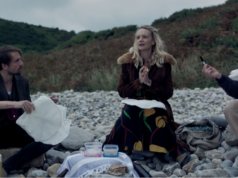Transcribing an interview with Jeff Fraley and Harry Lynch proves to be hard work.
Interviewed by phone from their offices in Austin, they both talk fast and frequently finish each other’s sentences. No surprise, since Fort Worther Fraley and Dallas native Lynch have been making films together since 1996, when a mutual friend introduced them. The meeting inspired Fraley to walk away from a potential political career and make movies with Lynch. Their latest work, Recapturing Cuba, airs this week on public television. The half-hour documentary, shot in 2003 and only now finding a wider audience, followed Dallas artist Rolando Diaz as he returned to his native Cuba for the first time since leaving with his family as a small boy during Castro’s revolution. Fraley said the project gave the filmmakers a chance to return to their own artistic roots: “We had a small crew and tiny cameras, because we didn’t know what to expect in Cuba.”
Fort Worth audiences have already seen some of Fraley and Lynch’s documentary work. Making the Modern, about the construction of the Modern Art Museum of Fort Worth, played here shortly after the museum opened several years ago, and their film about cowboys across the globe, Ride Around the World, enjoyed a run at the Museum of Natural History’s IMAX theater. Their production company had a Fort Worth office from 2000 to ’05, but now they’re entirely Austin-based. “After finishing Making the Modern, we realized we needed to be able to see each other every day,” said Fraley, who nevertheless praises his hometown’s generous philanthropic support for the arts and thinks it could be its own film town. “There’s great artistic talent and spirit there. Austin could learn a lot from Fort Worth, just as Fort Worth could learn from Austin.” Indeed, the name of their production company, Trinity Films, reflects their North Texas origins.
Fraley and Lynch have traveled the world as a result of their endeavors, which are financed through combinations of private investors, public grants, and occasional clients like the Modern. Recapturing Cuba was done on spec after they met Diaz and saw his expressionistic paintings, which draw heavily on the iconic images (musicians, cigars, beaches, street markets) of his native country. “So much of his work is based on his childhood in Cuba,” Fraley said. “He was starting to forget it, and he wanted to see it while Castro was still there, before a new government came in and turned the place into Shreveport.”
Lynch remembers being awed by the quality of the work produced by the Cuban artists. He said the trip was worth bureaucratic hassles such as having the U.S. Treasury Department initially deny their application to travel to Cuba, only to later reverse itself without explanation. “We think [the initial denial] was a clerical mistake,” he said. “Many U.S. filmmakers go there illegally through Mexico or Canada, but we didn’t want our stuff confiscated.”
Their next project will be closer to home: a documentary on Barnett Shale. They’re playing it close to the vest, as far as the subject matter and what kind of distribution is being negotiated, but they hope audiences will be able to see the film later this summer. In the meantime, the pair are busy gathering story ideas and figuring out ways to streamline their storytelling. “Ideas are as free as the wind,” said Fraley. “It’s all in the execution.”
Recapturing Cuba: An Artist’s Journey
8:30pm & 11pm Wed and 3:30am Sat. KERA-TV.











